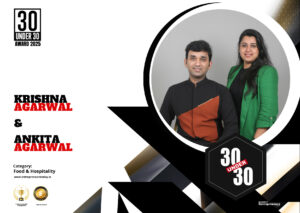
“Starting up isn’t about perfect timing. It’s about believing in your idea when the world tells you to wait. Building a business is less about the right moment and more about the right mindset.”
30 Under 30 Nominee Krishna Agarwal is the founder of Fogon. a delivery-first cloud kitchen that grew from one outlet in 2020 to ten across Delhi NCR.
Recently featured in Zomato campaigns with Ranveer Singh and Chris Gayle, Fogon is known for its team’s focus on flavour, consistency, and experience across Noida, Gurgaon, and Ghaziabad.
Krishna is a 26-year-old founder who brings equal parts business sense and a true love of food into his business. After completing his studies at Symbiosis International University, he turned his vision into a business at the height of the COVID-19 pandemic.
Krishna’s attention to flavour precision, operational efficiency, and customer delight has made him a leading voice among a new generation of food entrepreneurs. He is agile, ambitious, and deeply rooted in India’s culinary soul.
Krishna’s sister and co-founder, Ankita Agarwal, is the quiet force behind Fogon. A software engineer turned food entrepreneur, she brought more than ten years of IT experience to a kitchen that needed systems as much as spice.
She designed the data systems, tightened operations, and shaped the customer experience so every order felt dependable. Speaking of her role in Fogon, Krishna asserts,
“Her strength is that rare mix of analytical rigour and creative taste. She deals with the messy operational problems and streamlines operations, data systems, and customer experience, ensuring Fogon’s growth is not just flavourful but also scalable.”
Launching Fogon
In 2020, Krishna launched Fogon as a delivery-first cloud kitchen. The idea felt urgent since people wanted the comfort of familiar flavors at home. He says,
“I wanted to build a brand that would bring the comfort of North Indian and Chinese flavours straight to people’s homes.”
What started as a single kitchen has grown into several outlets across the Delhi NCR. Today, Fogon has become a multi-concept food umbrella that also includes Santa Banta Da Dhaba and Yummy Yummy Chinese. Each label serves a different craving, but all three keep the same standards of taste and consistency. He says,
“It began when the world slowed down and kitchens became the place people gathered. The idea was simple. Deliver the warmth of home cooking with the precision and excitement of a restaurant. The name also follows the same sentiment; the word Fogón comes from the hearth or stove in Spanish. For us, it signals warmth, fire, and togetherness. It is the place where aromas and stories meet. What truly differentiates us is our deep understanding of our audience and our ability to adapt to their needs.”
Both founders see technology and taste as natural partners. “Good food needs good systems,” they say. “If the backend is solid, the front of house can be soulful.” They highlight,
“Fogon is for families who want a home-cooked hug, for friends chasing midnight noodles, and for any celebration that needs flavor to match the mood. We design menus that comfort and surprise in equal measure. We are building more than a menu. We are building a community that believes great taste should feel like home wherever you are.”
What’s Different?
What sets them apart in the competitive market is that Krishna runs Fogon like any other modern food business. He uses data to tune operations, invests in flavor precision, and builds systems that scale without losing soul. That balance of craft and discipline is what lets the brand deliver quality every single time.
The chefs marry the slow, soulful gravies of North India with the fast, sizzle-driven techniques of Chinese cooking. From buttery dal tadka to smoky chilli chicken, each dish carries a note of nostalgia and a touch of adventure.
Navigating Troubles
Launching a food brand in the middle of a global pandemic was far from easy. With lockdowns, supply disruptions, and safety concerns, every decision carried uncertainty.
Another hurdle for Krishna was that the delivery networks were strained, ingredient sourcing became unpredictable, and earning customer trust required both empathy and innovation.
What helped him through the uncertain times was seeing opportunity in adversity. He believed that even when dining out wasn’t possible, people still craved comfort, flavor, and connection through food, and that was the connection he was determined to fill.
The Milestones
“When you start in uncertain times, every milestone feels like a victory against the odds.”
One of the major milestones for Krishna is that Fogon has been recognised as a Times Food Delivery Icon. They were also featured as promising new launches at The Food Delivery Icons and highlighted in What’s Hot in Delhi, a Times Internet Group platform, which validated that their delivery-first model is resonating with Delhi’s food scene.
Krishna is also proud of the fact that Fogon has worked with Feeding India and local relief drives to deliver meals to communities in need. These efforts were small in scale but consistent, driven by a simple belief: food should comfort everyone, not just those who can pay. He believes that hospitality carries responsibility and that growth matters most when it includes giving back. Krishna shares,
“During the pandemic, we saw how fragile daily life could be. Food became more than just comfort. Even if we couldn’t solve every problem, we wanted to do our part to remind people that someone out there still cared enough to send a warm meal.”
The Next Chapter
The next chapter for Fogon is all about expanding pan-India. The company has ambitious plans for the future, which include catering for events outside the Delhi NCR. What started as one cloud kitchen in the region now runs ten outlets, and they believe it’s just the beginning.
Krishna wants Fogon to become a household name, but growth will not dilute their promise. Quality that travels well from kitchen to table remains their single measure of success. Lastly, Krishna says,
“We’re not just delivering meals. We’re building a community that believes great taste should feel like home—wherever you are.”
The Takeaways
One valuable lesson he has learned is to follow your heart and understand that success requires perseverance, patience, and honesty. Moreover, for aspiring entrepreneurs, he advises starting somewhere and putting your heart and soul into your endeavours.
He firmly believes that with dedication and hard work, one can eventually achieve success. Lastly, Krishna says,
“Customer satisfaction is a crucial KPI for success. It’s important to keep clients satisfied in the hospitality sector. A company is considered to be successful when its patrons automatically choose it as the first option. It’s crucial to understand that success includes not only profitability but also employee and customer satisfaction.”







